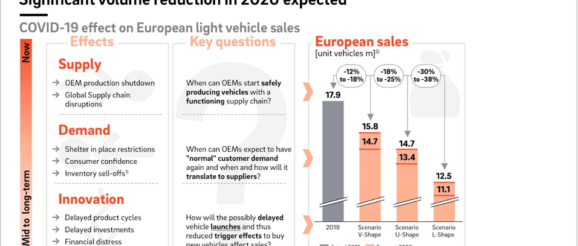How innovation could boost car companies hit by coronavirus | World Economic Forum

In many countries, the car industry is a key driver of GDP as well as a major employer. Trouble in this industry will lead to serious challenges for the wider economy. To overcome these challenges, carmakers are already asking for support, and governments have responded with short-term measures such as supplying financial assistance and facilitating short-term work. However, more is required for the medium and long term. Governments and companies will need to start to prepare for what comes after the survival of the acute crisis. The question will shift from how to manage the crisis, to its longer-term impacts and its potential effects on the future of the industry.
One crucial step will be to encourage innovation. Simplifying and updating regulations around piloting and testing would be one way of helping companies innovate, and comes with the additional advantage of not needing extra financial input from the public purse.
For companies trying to innovate and bring new products to market, this rigid and fragmented regulatory landscape has led to uncertainty and unpredictability. Regulatory complexity typically increases production costs in the car industry. It can also slow down and stifle innovation. This remains true and becomes even more relevant in an economic crisis, when a clear path to market is even more critical. Without it, there is a risk of losing the momentum for the development and future deployment of a technology, which has the potential to significantly benefit society, promising a safer, more environmentally friendly, efficient and accessible way of transport.
To realize the great opportunities of growth, which will be more important than ever before, as well as to ensure that the positive effects benefit society and mitigate the risks, governments should proactively shape the future of mobility.
Coalitions like CEPI are made possible through public-private partnerships. The World Economic Forum is the trusted global platform for stakeholder engagement, bringing together a range of multistakeholders from business, government and civil society to improve the state of the world.
